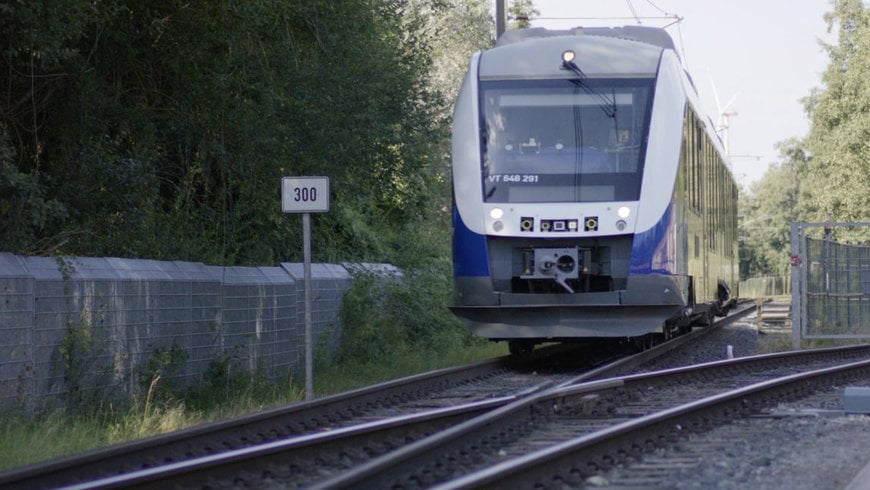railway-international.com
26
'24
Written on Modified on
ALSTOM PIONEERS AUTOMATED REGIONAL TRAINS
The ARTE Project is set to revolutionize the rail network by implementing automated train operations (ATO) using the European Train Control System (ETCS).
www.alstom.com

Driverless trains are becoming increasingly viable thanks to advancements in artificial intelligence, sensor technology, and connectivity
Alstom recently presented in Salzgitter, Germany, the ARTE (Autonomous Regional Train Evolution) project. The ARTE Project is a joint research project of Alstom, the German Aerospace Center (DLR) and the Rail Operations and Infrastructure Department at TU Berlin with funding support from the Federal Ministry for Economic Affairs and Climate Action and Lower Saxony’s Ministry of Economics, Transport, Building and Digitalisation.
The Landesnahverkehrsgesellschaft Niedersachsen (LNVG) is providing two regional trains for the tests. The project is set to decisively support the digitalisation of the German rail network by implementing automated train operations (ATO) using the European Train Control System (ETCS) without the need for additional trackside equipment. As Alstom is working towards fully leveraging automation, this initiative focuses on existing rail lines, ensuring a seamless transition to modernised operations.
The ARTE project is intended to show how accompanied, automated train operation can be implemented in today’s rail network by retrofitting the vehicles. Automated driving requires camera systems for obstacle detection, and instead of trackside ETCS equipment, a suitable image recognition system processes the existing railway signals.
Remote Train Operation
Thanks to Remote Train Operation (RTO) systems, operators would be able to control trains remotely. And either from the depot or from a dedicated remote driving station, they would then be able to take control of the train and drive it to the next station. In the case of RTO, the ARTE project is providing a very simple solution – a tablet which is linked in with the train control.
So, operators would always see the live transmission of the camera in front of the train, providing the remote driver with the same kind of visibility the actual driver would have. They can break the train, and they can accelerate the train, remotely.
The DLR supports this by analysing and evaluating the findings on a stakeholder-specific basis in order to define new roles and tasks for the operating personnel as well as opportunities for their qualification. The objectives of TU Berlin are to develop and test an easy and flexible mobile remote control and making sure that safety requirements are fulfilled and approval of the assessment bodies is obtained.
The Promise of Driverless Rail
Alstom recently presented in Salzgitter, Germany, the ARTE (Autonomous Regional Train Evolution) project. The ARTE Project is a joint research project of Alstom, the German Aerospace Center (DLR) and the Rail Operations and Infrastructure Department at TU Berlin with funding support from the Federal Ministry for Economic Affairs and Climate Action and Lower Saxony’s Ministry of Economics, Transport, Building and Digitalisation.
The Landesnahverkehrsgesellschaft Niedersachsen (LNVG) is providing two regional trains for the tests. The project is set to decisively support the digitalisation of the German rail network by implementing automated train operations (ATO) using the European Train Control System (ETCS) without the need for additional trackside equipment. As Alstom is working towards fully leveraging automation, this initiative focuses on existing rail lines, ensuring a seamless transition to modernised operations.
The ARTE project is intended to show how accompanied, automated train operation can be implemented in today’s rail network by retrofitting the vehicles. Automated driving requires camera systems for obstacle detection, and instead of trackside ETCS equipment, a suitable image recognition system processes the existing railway signals.
Remote Train Operation
Thanks to Remote Train Operation (RTO) systems, operators would be able to control trains remotely. And either from the depot or from a dedicated remote driving station, they would then be able to take control of the train and drive it to the next station. In the case of RTO, the ARTE project is providing a very simple solution – a tablet which is linked in with the train control.
So, operators would always see the live transmission of the camera in front of the train, providing the remote driver with the same kind of visibility the actual driver would have. They can break the train, and they can accelerate the train, remotely.
The DLR supports this by analysing and evaluating the findings on a stakeholder-specific basis in order to define new roles and tasks for the operating personnel as well as opportunities for their qualification. The objectives of TU Berlin are to develop and test an easy and flexible mobile remote control and making sure that safety requirements are fulfilled and approval of the assessment bodies is obtained.
The Promise of Driverless Rail
Driverless trains are becoming increasingly viable thanks to advancements in artificial intelligence, sensor technology, and connectivity. These innovations present a chance to reshape the safety sustainability, and operational efficiency of public transit. They can also support economic growth.
- Safety: Driverless systems provide an opportunity to enhance safety dramatically by minimising human involvement, significantly reducing the risk of errors. Autonomous trains continuously monitor their environment, respond swiftly to obstacles, and comply with stringent safety protocols.
- Sustainability: The ‘European Green Deal’ aims to achieve a reduction in greenhouse gas emissions by at least 55% compared to 1990 levels by 2030, underscoring the necessity of adopting innovative technologies like driverless rail transport to meet sustainability targets.
- Operational Efficiency: Autonomous trains can operate around the clock without the downtime that traditional systems require, resulting in reduced operational costs and enhanced service quality.
- Economic Growth: Efficient rail systems play a crucial role in economic growth. Countries like China and India are investing heavily in their rail infrastructure, recognizing that modern, reliable rail services can drive economic development and enhance connectivity.

